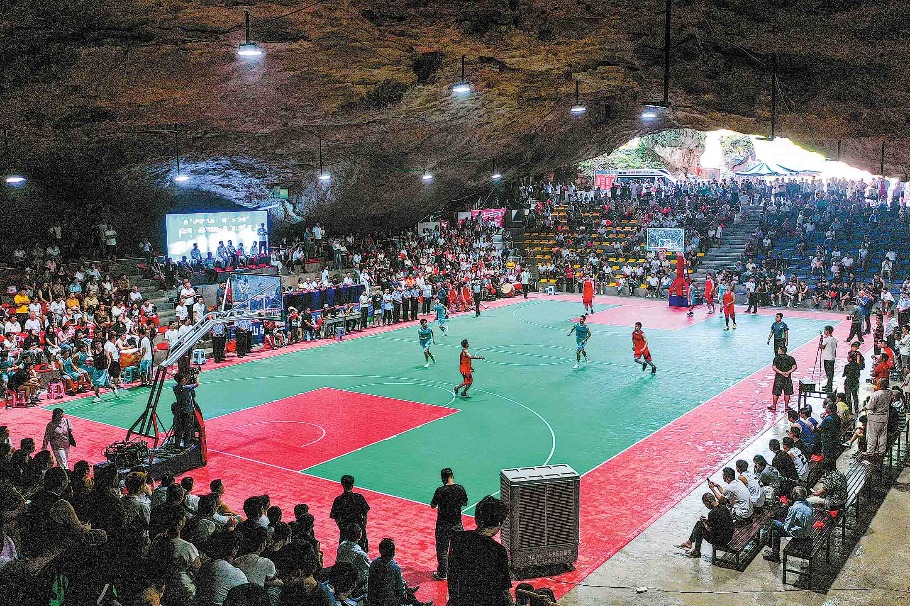Sports schools readjust approach in quest to strike the right balance

China's sports system, which traditionally relies on State-sponsored sports schools to produce athletes at national level, can be considered a massive success, having produced 275 gold medals since the country returned to the Olympic fold in 1980.
But with times changing, these schools have had to reassess their teaching methods.
The nation's education system is one of, if not the most, challenging in the world. Chinese students spend twice as much time on homework each day compared with the global average.
For most families, good grades are a stepping stone to a bright future. As a result, the desire to see one's child become a national athlete is gradually waning.
Many sports schools have relaxed their traditional requirement for students to study, train and live full-time on campus. They have also changed their curriculum, moving away from a model heavily skewed toward sporting excellence to one that is more holistic and equips them with the life skills they will need when their sporting careers end.
For example, in 2012, the Shanghai Sports School introduced a policy of rejecting students who failed their academic entrance exams-sending a message to parents that sports training is a form of education, rather than a means to winning medals and national glory.
Liu Xiaoma, director of the Shanghai Water Sports Center, which oversees development of the municipality's sailing sports, said: "Society has formed a consensus that sports is not everything. All-around development is what's best for the athletes and for the long-term healthy development of China's sports."
Xu Lijia, gold medalist in the women's Laser Radial sailing competition at the 2012 London Olympics, agrees with this approach.
A product of State-sponsored sports schools, Xu used to spend most of her weekdays training before college. She only studied at night and during weekends.
"It's a great sacrifice," said Xu, who currently lives in Weymouth, a resort in southwest England, after completing her graduate studies in sports news broadcasting at Southampton Solent University.
As director of the athletes commission at the Chinese Yachting Association, Xu encourages fellow sailors to strike a balance between their studies and sporting aspirations. She said they need more than athleticism to succeed in life after retiring from competition.
However, Han Jing, head of the sailing team affiliated to the Jing'an Youth Amateur Athletic School in Shanghai, said finding this balance can be extremely difficult. Han's daughter is a member of the school's sailing team.
Han said sports training is incredibly time-consuming, especially for sailors in Shanghai. Unlike other coastal cities such as Qingdao, Shandong province, and Xiamen, Fujian province, Shanghai has only a few training areas. These comprise Dianshan Lake in its western suburbs, man-made Dishui Lake in the southeast of the city, and the port areas in Fengxian and Jinshan districts.
As these training locations are more than 60 kilometers from the downtown area, two-way travel can take up to four hours, leaving sailors with little time for leisure or studies after training.
To address this issue, the school has set up its summer camps near the training venues so that athletes can spend time on their studies without having to commute.
This initiative has been a success, as Han said most sailors at the school have scored straight As.
The school maintains that while its students do not need to score such impressive results, a certain level of academic achievement is required.
Han said that striking a balance is not just for the sake of students' futures-it can also benefit their sporting activities.
"There is this long-standing stereotype that people with strong bodies have slow minds," said Han, a former national rowing champion and gold medalist in the women's fours at the 14th Asian Games in Busan, South Korea, in 2002.
"This is simply not true. It's well known in the sports fraternity that the smarter a student is, the better the chance that he or she will excel in competitive sports," Han added.
She said this is especially true for sailing, as competitors need more than physical strength to win a race. The ability to think on one's feet and react to the prevailing conditions is often required to outsmart the competition.
The school's focus on balance has also led to heartening changes in students' behavior.
Han recently received a call from a student's father, who told her how his rebellious teenage daughter had suddenly mellowed and had been studying hard at night to catch up with her academic work since joining the sailing team.
"I told the father that no magic was involved. All we ask for is that everyone studies as hard as they train," Han said.
Nine-year-old sailor Jerry Shi has been doing just this.
The boy's father, Shi Qiao, said, "It was great to see him coming home from school and telling us that he scored straight As."
He said his son wasn't happy that he had initially failed to live up to his parents' expectations, or that such grades gave him bragging rights at school.
However, he was delighted that he could continue with his sailing training on weekends and during summer vacations.
Today's Top News
- Taiwan secessionists deluding themselves believing external support will win the day: China Daily editorial
- Two years on, Gaza's agony calls for action: China Daily editorial
- 2025 Nobel Prize in Chemistry awarded to 3 scientists
- Egypt's President invites Trump to attend Gaza's deal ceremony when reached
- National Day Holiday showcases China's robust economic vitality
- Openness, win-win features of Chinese economy






























